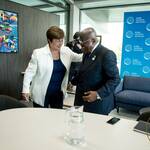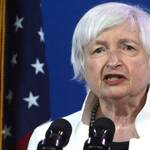An International Monetary Fund (IMF) staff team, has reached a staff-level agreement with Ghana, paving way for the Board to approve another $360 million for the country.
This development comes following a third revolution of the country’s on-going $3 billion IMF loan-supported programme for economic recovery and debt sustainability.
In a statement issued by the Mission at the end of a two- week long review, held between September 24 and October 4, 2024, the team noted that Ghana’s performance under the three-year programme, has been “satisfactory.”
Mr Stéphane Roudet, Mission Chief for Ghana, said, “upon completion of the Executive Board review, Ghana would have access to SDR 269.1 million (about $360 million), bringing the total IMF financial support disbursed under the arrangement, since May 2023, to SDR 1,441 million (about $1,920 million).”
“All end-June 2024 quantitative targets were met, and progress on key structural reforms has continued notwithstanding delays in a few areas,” he noted.
Mr Roudet stated that the country’s economic growth in the first half of 2024 was much higher than initially envisaged, primarily fuelled by mining, construction, and information and communication activity.
There was also a broadening of the sources of growth across sectors during the second quarter, with inflation seeing a continued decline.
On the monetary policy front, he said the team observed that the Bank of Ghana showed commitment to maintaining a tight stance to support a continued decline in inflation.
“Fiscal performance in 2024 has so far been strong, and Ghana is on track to achieve a primary surplus on a commitment basis of ½ per cent of GDP, despite emerging spending pressures from the recent drought in the northern regions and difficulties in the energy sector,” Mr Roudet said.
Also, the country’s external sector saw considerable improvement in 2024, driven by strong exports—particularly gold and to a lesser extent oil—and higher remittances with international reserves accumulating beyond programme targets.
The financial stability has been maintained, with progress on recapitalisation and increased bank profitability, he stated.
He indicated that the recent dry spell in the Northern regions would adversely impact agricultural output, potentially constraining growth and adding pressure on food prices for the remainder of the year.
“However, the government’s policy response should help mitigate these risks,” the IMF Mission Chief for Ghana said.
IMF staff met with Dr Mohammed Amin Adam, Finance Minister, Dr Ernest Addison, Governor, Bank of Ghana (BoG), and their teams, representatives from various government agencies, and other stakeholders.
- Tuesday, May 6, 2025 Newspaper Headlines - 6 May 2025
- Mahama unveils Code of Ethics for appointees - 5 May 2025
- No system breach, MoMo is safe, secure- MTN - 5 May 2025




